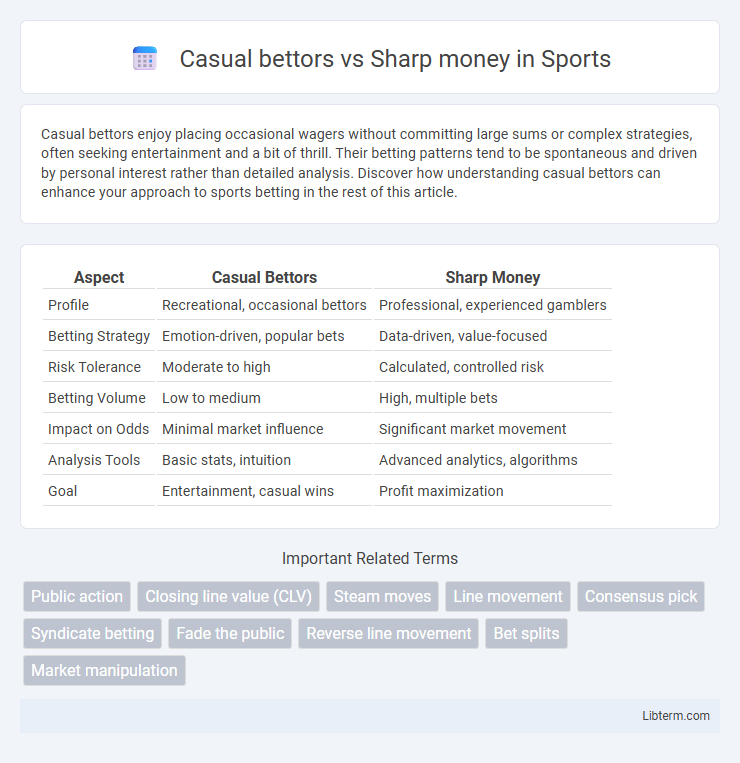Casual bettors enjoy placing occasional wagers without committing large sums or complex strategies, often seeking entertainment and a bit of thrill. Their betting patterns tend to be spontaneous and driven by personal interest rather than detailed analysis. Discover how understanding casual bettors can enhance your approach to sports betting in the rest of this article.
Table of Comparison
| Aspect | Casual Bettors | Sharp Money |
|---|---|---|
| Profile | Recreational, occasional bettors | Professional, experienced gamblers |
| Betting Strategy | Emotion-driven, popular bets | Data-driven, value-focused |
| Risk Tolerance | Moderate to high | Calculated, controlled risk |
| Betting Volume | Low to medium | High, multiple bets |
| Impact on Odds | Minimal market influence | Significant market movement |
| Analysis Tools | Basic stats, intuition | Advanced analytics, algorithms |
| Goal | Entertainment, casual wins | Profit maximization |
Understanding Casual Bettors and Sharp Money
Casual bettors primarily rely on intuition, emotions, and popular trends when placing bets, often influenced by team loyalty and recent performances, resulting in less consistent outcomes. Sharp money refers to bets placed by professional or highly experienced bettors who use analytical data, advanced models, and statistical research to identify value and exploit market inefficiencies. Understanding the behavior of casual bettors helps sportsbooks adjust odds, while sharp money often signals more informed betting patterns that can predict market movements.
Key Differences Between Casual and Sharp Bettors
Casual bettors typically rely on intuition and popular trends, placing small, infrequent bets without extensive research, while sharp bettors utilize data analysis, advanced models, and statistical insights to identify value bets consistently. Sharp money is characterized by higher stakes and strategic wagers that exploit market inefficiencies, often influencing betting lines and odds. The key difference lies in the approach: casual bettors seek entertainment and simple wins, whereas sharp bettors aim for long-term profitability through disciplined, informed betting strategies.
Betting Habits: Recreational vs Professional Approaches
Casual bettors typically rely on intuition, trends, and popular opinion, placing smaller, less frequent bets for entertainment. Sharp money, representing professional bettors, employs data-driven strategies, in-depth analysis, and disciplined bankroll management to identify value in odds. These contrasting betting habits highlight the recreational nature of casual bettors versus the calculated, profit-focused approach of sharp money.
Bankroll Management: Casual vs Sharp Strategies
Casual bettors often lack a structured bankroll management strategy, risking arbitrary amounts without consistent limits, which increases the likelihood of significant losses. Sharp bettors implement disciplined bankroll management, typically staking a fixed percentage of their total funds based on confidence levels and value bets to minimize risk and maximize long-term profitability. This strategic approach allows sharp bettors to withstand variance while preserving capital, distinguishing them from casual bettors who may chase losses or bet impulsively.
Line Movement Explained: The Impact of Sharp Money
Line movement in sports betting is heavily influenced by sharp money, as professional bettors place large, informed wagers that sportsbooks must react to in order to minimize risk. Casual bettors often bet based on intuition or popularity, causing initial line imbalances that sharp money corrects by forcing sportsbooks to adjust odds. This dynamic ensures that sharp money serves as a key indicator of true market value and often predicts more accurate outcomes than casual money alone.
Information Sources: Public Perception vs Data-Driven Analysis
Casual bettors primarily rely on public perception and mainstream media for information, often influenced by popular narratives and emotional biases. Sharp money operates using data-driven analysis, emphasizing advanced statistics, historical trends, and predictive modeling to identify value bets. This fundamental difference in information sources leads to contrasting betting strategies and outcomes in sports wagering markets.
Risk Tolerance and Bet Sizing Comparisons
Casual bettors typically exhibit lower risk tolerance, placing smaller, less calculated bets driven by intuition or entertainment rather than data analysis. Sharp money, composed of professional bettors and syndicates, demonstrates higher risk tolerance, leveraging extensive research and statistical models to size bets optimally for maximizing expected value. The contrast in bet sizing reflects divergent strategies: casual bettors favor modest wagers to limit losses, while sharp bettors strategically adjust bet sizes according to confidence levels and edge, emphasizing long-term profitability.
Sportsbooks’ Response to Sharp Money
Sportsbooks implement dynamic line adjustments and limit exposure to sharp money, which represents professional bettors with high accuracy and influence on betting lines. By monitoring sharp money patterns and adjusting odds accordingly, sportsbooks minimize risk and maintain balanced action to protect profit margins. Risk management strategies include reducing maximum bets and temporarily closing certain markets to counteract the impact of sharp bettors.
Spotting Sharp Action: Indicators and Trends
Sharp money is characterized by large, timely bets placed by professional bettors who consistently find value in odds, often leading to line movement before game start. Indicators of sharp action include sudden, significant changes in betting lines, increased betting volume on specific odds, and consensus across multiple sportsbooks adjusting their lines accordingly. Tracking these trends allows casual bettors to identify where informed money is influencing the market, providing opportunities to align their bets with expert insights.
How Casual Bettors Can Learn from the Sharps
Casual bettors can improve their betting strategies by studying sharp money patterns, which reflect informed and data-driven wagers placed by professional bettors. By analyzing sharp money movements and understanding the underlying factors such as line shifts and betting percentages, casual bettors can identify value bets and avoid common biases. Adopting discipline, conducting thorough research, and tracking betting trends like the sharps enhance decision-making accuracy and long-term profitability.
Casual bettors Infographic

 libterm.com
libterm.com